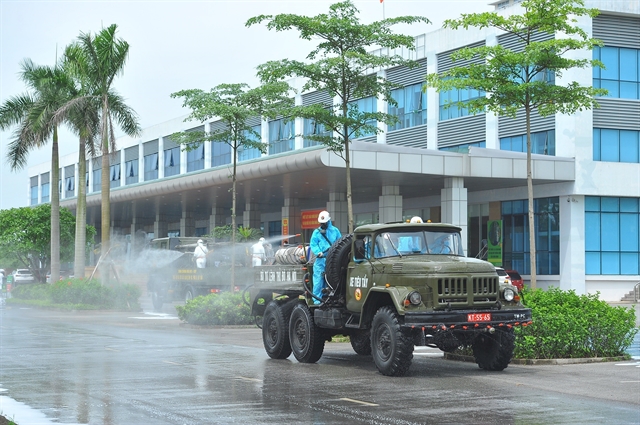 Society
Society


|
| The National Hospital for Tropical Diseases in Hà Nội's Đông Anh District is sterilised after more cases of COVID-19 were detected. VNA/VNS Photo Minh |
HÀ NỘI — Soldiers from the Vietnamese army’s chemical division on Thursday disinfected the National Hospital for Tropical Diseases in Hà Nội after it became a COVID-19 hotspot.
The move came as Việt Nam reported 17 new cases of COVID-19 on Thursday connected to the hospital in Đông Anh District, raising the number of infected cases there to 22.
Around 70 soldiers and 15 special vehicles were mobilised to spray more than 200,000 litres of disinfectant on 150,000sq.m of the hospital including campus, patient’s reception hall, examination area, emergency department and underground parking lot.
“This one is more dangerous in nature due to the variant of SARS-CoV-2,” said Senior Lieutenant Colonel Trần Văn Chung.
“We have been determined since the day the pandemic broke out again, especially before the news of the situation at the National Hospital for Tropical Diseases’ branch in Đông Anh recently."
Lessons drawn
Minister of Health Nguyễn Thanh Long said the virus could spread between departments in the hospital or infect patients’ relatives.
“The matter is being evaluated by concerned agencies,” Long said.
He added that the most important thing was that as soon as the incident was detected, the Ministry of Health (MoH) locked down the entire hospital and screened all staff as well as patients and their relatives.
The ministry also requested the hospital send a list of people who had been to the facility for medical examinations and treatment from April 15 to localities to trace, screen, isolate, and test.
Long said: “We have a lot of experience in this field. Bạch Mai Hospital was once isolated, but the scale of Bạch Mai Hospital is much larger than that of National Hospital for Tropical Diseases.
“We believe that localities should urgently trace people who have been in contact with people at the hospital and promptly handle the situation in accordance with MoH’s regulations.”
He said that lessons should be learned from this incident and it was necessary to review the isolation environment, quarantine and infection management.
After exchanging information with relevant agencies and experts, the MoH decided to extend the quarantine period from 14 to 21 days.
The minister emphasised the need to continue monitoring the health of people for seven days after they finished compulsory quarantine.
The testing capacity should be raised to up to five times to ensure the safety and prevent infection.
The MoH has requested hospitals to screen patients and health workers and implement necessary measures to avoid infection. — VNS




